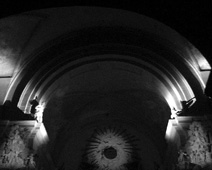The dream of two artists – composer Gintaras Sodeika and theatre director Oskaras Korsunovas – to produce a chamber opera has come true. On August 14 a theatrical concert version of their work Vinter (Winter) was presented at the Church of St. Catherine in Vilnius, during the St. Christopher Summer Music Festival; finalized theatre performance is scheduled for the coming December, it will be produced and premiered by the Oskaras Koršunovas Theatre.
Both artists have already realized more than 20 theatre productions and could be surely called the strongest creative tandem in Lithuania. Having started their creative collaboration in 1990 with the performance There to be Here (based on the texts by Daniil Kharms), already then both artists aimed for a more distinct role of music (according to Gintaras Sodeika, "so that music itself would become a character"), which is normally limited to the background or illustrative function in drama performances. Their later productions seem to have consolidated this aim – Hello Sonya New Year (1994, based on Daniil Kharms) was called a 'dadaist musical'; the production of Solitude for Two (2003, based on the play by the Lithuanian playwright Sigitas Parulskis) may be called a halfway between the musical drama and opera; while the most recent production Playing the Victim (2005, based on the play by Oleg and Vladimir Presnyakovs) is close to a proper musical. How do they achieve it? It looks like the director and the composer feel the each other’s way of thinking in the process of producing a theatre performance: the director thinks about music as an element of direction, and the composer regards the director's work as a component of music. Perhaps that is why Sodeika drops a suggestion to his listeners, " ...I recommend not to listen to my music without seeing the performance".
The acquaintance of Gintaras Sodeika and Oskaras Koršunovas with the Norwegian playwright Jon Fosse and his work started three years ago in Oslo, when they staged his play Vinter at the Norwegian National Theatre. The successful production with Norwegian actors inspired the Lithuanian artists to produce a chamber opera, especially since Fosse himself had once remarked that he wrote Vinter like a song. The play is a melancholic and poetic reflection on tacit feelings between man and woman, about what could have happened between them, about love as a riddle. As Oskaras Koršunovas suggests, in this play one can find "the entire existence of life, which is being created around two poles – the man and the woman – and resonates during their chance meeting. On the one hand, the play is very prosaic; on the other, everything that could have happened, this quiet love lies between unuttered words. I felt an urge to make this silent love speak..."
 |
The theatrical production, presented as a work-in-progress, was especially suggestive. A shadow of disturbing anxiety flashed by with the emergence of the very first sounds and the subdued light streaming upwards to the vaults of the church, where the spectral alabaster sculptures (which in fact were actors Vesta Grabštaitė and Rytis Saladžius with their faces and bodies bleached with chalk) standed. This anxiety was enhanced by the dark space of the church and the expressive recitatives of the soloists Sandra Janušaitė and Vytautas Juozapaitis. It is in the parts of the soloists rather than orchestra that the entire tension of the play is concentrated, visually also reflected in the actors' emotional gestures. In the course of the performance the actors inhabited almost the entire space of the church, the upper cornices, balustrades, the pulpit, and the altar. The pulpit became a room, the spread bedding turned into baroque draperies, and the altar became a place of love's elevation.
The transparency of the orchestra is created with minimalist means. The consonant sound of the orchestra becomes a certain counterbalance to the unpolished language of Fosse's play, which has been laid on the score directly without libretto. Having read the literary text, Gintaras Sodeika became convinced that "the music should be based on the dramaturgy of fragile musical states. I find it important also that the audience would be addressed in a language it can understand. And it should not necessarily be understandable to the point of banality – it still contains enough secret."
© Eglė Grigaliūnaitė
Lithuanian Music Link No. 13

